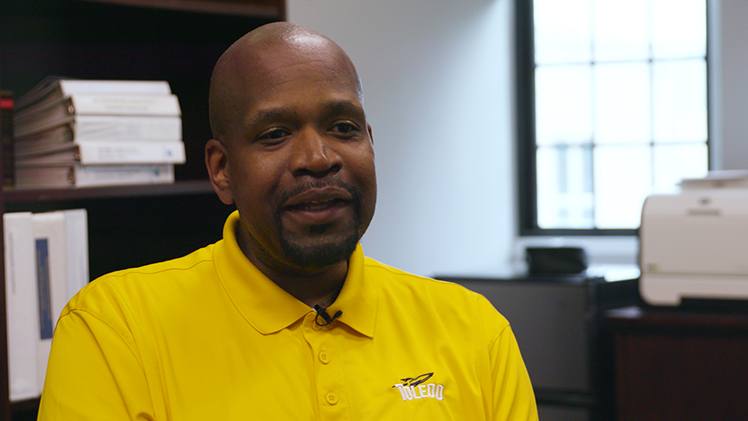Charles Jake was nervous.
Sitting at his doctor’s office for a checkup a little more than a year after undergoing bariatric surgery at The University of Toledo Medical Center, Jake realized he hadn’t taken his daily blood pressure medication. A nurse was about to put the cuff on his arm.

Charles Jake, vice president and general counsel at The University of Toledo, has lost about 80 pounds since undergoing bariatric surgery at The University of Toledo Medical Center in the spring of 2021.
“I was afraid they were going to see the reading and yell at me,” he recalled. “But it was normal — without the medication. That was a big win in my mind because that was really what had driven me to finally have the surgery.”
Jake, vice president and general counsel at The University of Toledo, has lost about 80 pounds since having the procedure in the spring of 2021.
“My blood pressure, which was my biggest concern, is normalized. I had plantar fasciitis in my foot, I had pain in my knees from carrying the extra weight. That’s all resolved with the weight coming off. My blood sugar thankfully was not a problem, but it’s stayed normal since then,” he said. “Medically it’s the best decision I’ve ever made in my life.”
Jake had been overweight most of his life, and though he’d tried various diets, nothing ever seemed to take. He knew bariatric surgery was an option, but he spent several years putting it off in hopes that the next diet or smartphone app might be the key to getting healthy.
A frightening at-home blood pressure reading finally pushed him to pursue the surgery at UTMC.
“It was really high,” he said. “I knew it wasn’t healthy, I knew it wasn’t sustainable even with medication. I thought if I want to be here to see my kids graduate, if I want to walk my daughter down the aisle, I’ve got to do something about this.”
Obesity is one of the most common diseases in the United States, affecting more people than cancer, chronic lung disease and chronic kidney disease combined.
The most recent data from the U.S. Centers for Disease Control and Prevention show nearly 42% of American adults are clinically obese, and that obesity costs the U.S. healthcare system almost $173 billion a year.
Even so, the lingering stigma of obesity represents a challenge for treating the condition, with many people feeling as though they are taking a shortcut by seeking medical assistance with their weight.
“It’s very common for patients undergoing bariatric surgery or patients taking weight loss medications to feel stigmatized. People think that they’re cheating,” said Dr. Justin Hsu, a fellowship trained bariatric surgeon at UTMC. “The reality is that our understanding of weight loss and obesity has changed dramatically over the last decade. We really try to emphasize that obesity is a disease with medical and surgical treatment options, not a lifestyle choice.”
That resonated with Jake.
“It was a different framing than anything that I had heard before,” he said. “It was really helpful and put my mind at ease about going through the process.”
Bariatric surgery is a general term referring to one of several different procedures aimed at helping people lose weight.
Jake had a vertical sleeve gastrectomy, which reduces the size of the stomach. UTMC also offers gastric bypass surgery, though Hsu said sleeve gastrectomy makes up about three-quarters of all weight loss surgeries in the U.S.
Done laparoscopically under general anesthesia, the vertical sleeve gastrectomy procedure takes about an hour. Surgeons remove as much as 70% of a patient’s stomach, including a part responsible for producing hormones believed to play a role in making you feel hungry. Most patients go home the next day.
Though all surgery comes with risk, the current risk of sleeve gastrectomy is lower than a routine gallbladder surgery. Bariatric procedures are usually well tolerated and possible even in individuals with other serious conditions.
In general, patients are candidates for bariatric surgery if they have a body mass index of 40 or more, or 35 or more with obesity-related health conditions like diabetes or hypertension. They also need to have made efforts to address their weight through diet and physical activity through the bariatric surgery program.
Patients typically begin seeing results within two weeks, with the peak weight loss coming about a year after surgery.
While bariatric surgery is not for everyone, for those who fit the criteria and are willing to commit to making long-term modifications in their lifestyle, it can be life changing.
“The most important thing is that you understand that even though bariatric surgery is the only long-term treatment for obesity, it is still only a tool and a small part of what we do,” Hsu said. “You still need to use diet and exercise afterward, but if you follow through, with our support, it can provide a long-lasting, significant improvement in your overall health.”
That was the case for Jake, who continues to receive follow-up care and counseling from UTMC.
“It’s your journey and it’s your health and you have to take ownership of that,” he said. “But for me, it was absolutely the right decision. I’m glad I did it. I wish I had done it earlier. I have no regrets about it and I’m really happy with the outcome.”
Individuals who are interested in learning more about UTMC’s bariatric surgery program can visit the UTMC website or call the Department of Surgery at 419.383.3759.